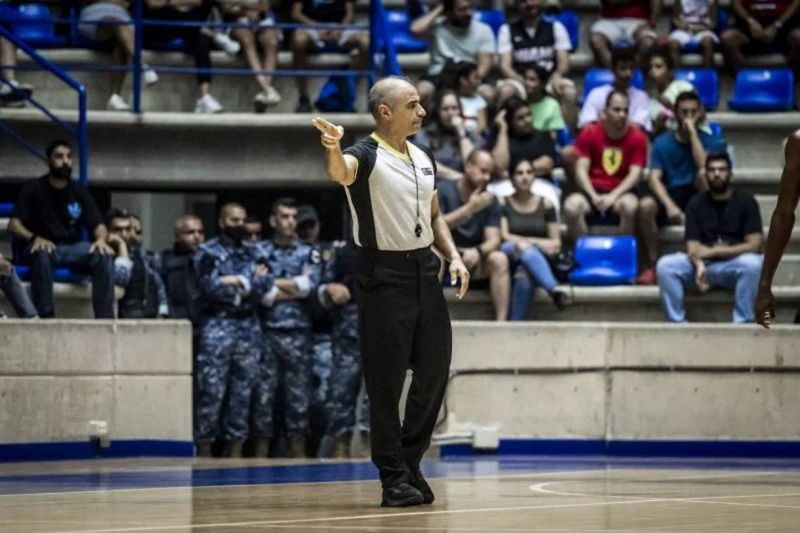
Rabah Noujaim during the friendly match between Lebanon and Côte d'Ivoire at the Nohad Nawfal stadium, August 15. (Credit: Lara Arabkurelian)
At first glance, the game seemed to hold limited significance, with both Germany and Angola having already secured spots in the Round of 16, but the 2006 Basketball World Cup’s preliminary round proved historic.
Over the course of the match and three overtime periods, the longest match in the history of a World Cup, the balance in the German team’s favor (108-103), with the legendary Dirk Nowitzki single-handedly scoring 47 points.
This showdown also etched a milestone in the journey of referee Rabah Noujaim, becoming the first Lebanese to officiate a basketball World Cup match. With over 25 years of experience, the 48-year-old Lebanese referee, chosen from a diverse group of 43 other referees hailing from 31 countries, returned to the court last Saturday to oversee the Serbia-China match (ending 105-63 in favor of Serbia).
It marked his return to the international game after a 17-year hiatus.
Best player at school
Noujaim’s passion for basketball began young, and he consistently poured his heart into the sport.
His dedication was evident as early as 1994 when he was named best player in the National Schools Championship.
His grasp of the sport’s regulations didn’t go unnoticed, catching the attention of an official responsible for referees unaffiliated with the Lebanese Basketball Federation (FLB), who suggested that Noujaim take up refereeing for amateur matches — a part-time job that he pursued for nearly three years until 1998.
It marked the start of his referee journey.
Noujaim became an FLB-approved referee in 1998 and began to officiate matches in the first division of the national league.
“Right from the start, you could see that he stood out from the rest with his calm demeanor and knowledge of the rules,” said Ziad Tannous, a fellow graduate and current international referee.
At the same time, Noujaim enrolled in a training session organized by the federation with a view to becoming an international referee.
Remaining passionate about basketball and keen to push his progress even further, he continued to train and study until in 2000 he attained the elite category, the highest level of refereeing, which qualified him to officiate matches in the biggest international competitions (for both men and women), including the World Cup, the Olympic Games (2012 and 2020) and the Asian Cup.
“He’s a real leader on the court,” said Tannous.
“With his strong presence and charisma, he knows how to control the match, addressing the players and coaches, and intervening, when necessary,” said Elie Rustom, former national team captain and first division player with Dynamo.
“I was always reassured to know that the best referee in the region was officiating one of my matches,” he added.
An elite referee
“Maintaining elite status for all these years is by no means an easy feat, given all the difficulties and commitment it requires,” said Paul Skayem, the only other Lebanese elite referee. “Rabah Noujaim, who today has the longest active career as an elite referee in Asia, is the epitome of the professional referee.”
Attaining such a status demands that referees successfully clear written and fitness assessments every two years. These tests are designed to validate and reaffirm their command over the game’s regulations and their physical preparedness.
“The elite referee must be in good shape not only to play a full match at a high level, but to ensure that fatigue does not impede his judgment or decision-making,” explained a former international referee turned technical expert in refereeing, who requested anonymity because he’s not allowed to talk to the press in his current job position.
“Unlike the players, we don’t have the option of making changes during the match,” the anonymous source added.
Noujaim is not allowed to speak to the press due to his participation in the World Cup.
Skayem stressed that maintaining such a high level requires an enormous amount of discipline and sacrifice.
“To give you an idea, I normally train at least an hour a day on average, combining cardio and weight training,” he said. “But this training intensifies enormously before major international meetings or tests that you have to pass.”
In addition to physical fitness, Skayem emphasized the importance of the mental aspect in a referee’s career. “All our decisions are scrutinized and judged,” he said, “ even more since the advent of social media.”
“The clear demarcation between referees chosen for the World Cup and those who aren’t lies in the imperative of avoiding errors throughout the match,” said Tannous.
Like coaches and players, referees are under an obligation to meticulously ready themselves for their matches and gain a comprehensive understanding of the participating teams' game plan. They are required to take part in a training camp before the start of the tournament.
The camp has a busy agenda: meetings, structured physical training led by professionals, coaching and psychological drills, video analysis sessions, rule reviews and, ultimately, a doscussion of the criteria employed for making calls during the match.
This wealth of insights is something Noujaim will bring home to share with his peers.
To ensure the ongoing development and future prospects in refereeing, the federation and a group referees, among them Noujaim, have recently established a specialized academy aimed at training Lebanon’s novice referees. More than 40 young men and women have responded to this initiative. Among them, there may be tomorrow’s elite.
This story first ran in French in L’Orient-Le Jour, translated by Sahar Ghoussoub.